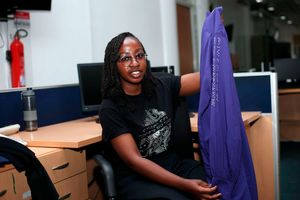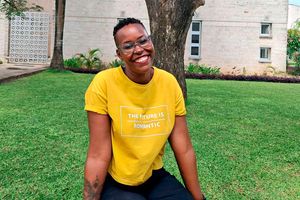
Joyce Gichinga, 27, is the owner of Washers Inn, a full-scale cleaning business offering post-construction cleaning, home deep cleaning, and upholstery cleaning, after failing in many other businesses.
Before Joyce Gichinga, 27, joined the Kenya Medical Training College (KMTC) in Eldoret to pursue a diploma in Biomedical Engineering, she discovered she was pregnant. She had been a stellar student in high school, excelling in mathematics and physics, making an engineering-related course a natural choice. She firmly believed in education’s power to transform lives, and so, as she prepared for college, there was no room for delay. But pregnancy wasn’t just a detour—it was a boulder in her path, a challenge she hadn’t anticipated.
“I have been educated through fundraisers,” she begins. “Joining college was possible because of one such effort from my community in Karatina.” Joyce is the proverbial child raised by a village—except in her case, this is not just a saying but a lived reality.
“I was one of those pregnant freshers,” she adds. “I was confused and even considered terminating the pregnancy.” A baby meant additional expenses that her struggling parents could not afford. “They barely managed my fees. With a baby on the way, I knew I had to find a way to support myself.”
While her situation was daunting, it ignited her entrepreneurial spirit. “I believe my struggles had a purpose—to guide me toward the path I was meant to take.” She spotted a business opportunity selling beauty ornaments to her fellow students.
“When the baby came, I took her to Karatina to stay with my mother. KMTC’s schedule is rigorous, making it impossible to balance studies and childcare.” To make ends meet, she began hawking beauty ornaments, carrying them in her bag and seizing moments between classes to make sales. “Business is in me,” she says. “It’s like an inbuilt system I came with into this world.”
A serial entrepreneur is born
Soon, she outgrew the small ornament business. “I transitioned to selling second-hand shoes,” she says. She first conducted market research—observing trends and preferences among students. After saving up, she visited Eldoret’s West Market in search of ‘camera’ second-hand shoes—the newest and most stylish selections. “If you get to the market early, you get the best picks, and they sell fast.”
Then came the colourful ‘happy socks’ trend in 2017. She hopped onto the wave and made a tidy sum. “I made good money selling socks, enough to start buying second-hand shoes in bulk rather than handpicking pieces.” She even hired someone to help manage the business.
In addition to these ventures, she took on small errands for fellow students, always seeking new ways to grow her income. “I thrive in action. I only stop when I feel something has fulfilled its purpose.”
Rising after failing exams twice
As she prepared for her final exams, an unforeseen hurdle arose. “KMTC has a critical assessment known as the Final Qualifying Exam—it determines whether you graduate or not. I failed.” To her dismay, she had failed her two favourite units. “To this day, I don’t know what went wrong.”
Determined, she returned to school to retake the units. “At KMTC, you don’t just resit a paper—you have to redo the entire unit, which meant staying for another year.”
Despite her efforts, she failed again. It was a turning point. “I had never envisioned myself in employment, even though I enjoyed my studies. Perhaps these failed attempts were a sign—to let go and focus on my purpose: business.”
Restarting all over again
Joyce relocated to Kenol in Murang’a to start afresh. “The transition was smooth because I knew what I wanted. I began hawking bags in Kenol and Nairobi, aiming to sell at least five a day.”
Her business flourished, prompting her to set up a makeshift stall in Githurai Kimbo, selling bags and men’s boxer shorts. By late 2019, she had saved enough to open a general shop in Karatina. However, things took a downturn. Her stall was demolished, and soon after, the COVID-19 pandemic struck.
She returned to her parents’ home, where her brother ran the shop. “The profit margins were too low. I had been accustomed to making good profits, and this was unsustainable. I fell into debt and made the hard decision to shut down.”
Unwilling to announce her struggles, she quietly moved back home and began working in tea farms. But her entrepreneurial instincts kicked in again. “I remembered I could make yoghurt, so I started that business. I also became a banana supplier, acting as a middleman between wholesalers and local vendors.”
For two years, yoghurt-making sustained her, but she eventually felt its purpose was fulfilled. She closed it down, along with the banana business.
Jobless and desperate
Jobless again, she found herself in despair. “I was willing to take anything.” A friend told her about a woman who needed a temporary nanny while she sat for exams. “I told myself, ‘I’d rather be a nanny than stay in this depressive pit.’ I packed my suitcase and left.”
When the short-term job ended, she was back on the streets. Her younger brother took her in at his home in Rongai.
Then came her moment of clarity. “I had written down countless business ideas. I had also been vocal on social media about dignifying domestic work. My audience was growing.”
She listed 22 business ideas she could start with minimal capital. One stood out: home cleaning services. “With the KSh 500 I had, a friend designed a flyer on Canva, which I printed and distributed.”
Initially, there were no clients, but through referrals, she started getting small cleaning jobs.
The birth of Washers Inn
What started as washing clothes evolved into Washers Inn, a full-scale cleaning business offering post-construction cleaning, home deep cleaning, upholstery cleaning, and even oven cleaning—“I dare say nobody in the market cleans ovens like we do.”
Today, Joyce has two permanent employees and works with casual workers as needed. She has expanded her services to include nanny training, teaching domestic workers essential housekeeping skills.
She has also launched a cleaning journal. “It works like a financial planner but tracks cleaning schedules—daily, weekly, monthly—to help homeowners stay organised. It reminds you of tasks like washing curtains or cleaning under the bed.”
Asked what she has learned, Joyce sums it up: “Resilience, adaptability, and faith. Never fear starting over. You’re never too far gone to rebuild.”
She continues to grow her business, proving that success is not about avoiding setbacks but about rising each time you fall.









